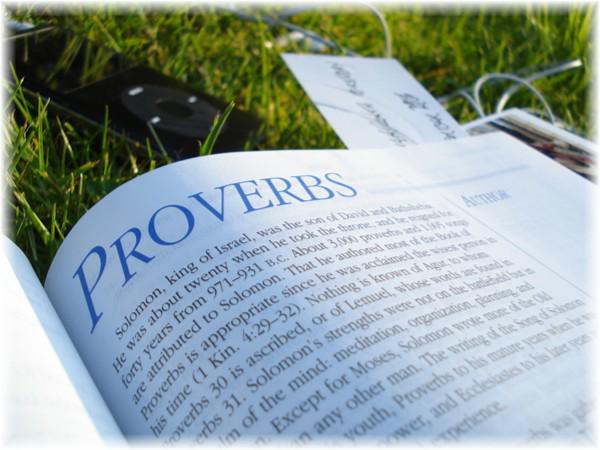| |
Introducing the Book of Proverbs
 The Book of Proverbs is a composite text, written by many authors over many centuries. The section covered in our study is chapters 1-9, which is a theological introduction to various collections of proverbial teachings in the rest of the book. These collections probably reflect the influence of the post-exilic community of scribes who played an important role in shaping Jewish traditions and whose work may have originated with King Solomon who is thought to have started the scribal schools which were responsible for developing wisdom teaching in Israel.
In the Christian arrangement of the OT books, Proverbs falls under the rubric of “Wisdom” writings, with Job, Psalms, Ecclesiastes and the Song of Songs. In the theology of the OT, Wisdom stands alongside the covenant theology reflected in all the other OT books where human beings are called to obedience. In Wisdom writings, by contrast, human beings can grasp the purpose of life and live in relationship with God by acquiring Wisdom which is frequently (see Proverbs 8) personified as a woman. This feminine embodiment of Wisdom has been important in our own time as an antidote to the heavily-masculine emphasis of the Bible and the Church.
Essentially biblical wisdom offers a view of God based on Creation which is expressed in two ways, primarily. First, God guarantees cause and effect which is the essential element of cosmic order. This explains the emphasis in Proverbs on the connection between act and consequence. Because God has created a cause and effect cosmic order Proverbs has little place for special divine intervention or even for prayer for deliverance. Proverbs’ essential message is that if you act right(eous)ly you will be blessed because by acting rightly you are living in obedience to God the Creator. Of course, experience teaches us that this doesn’t follow automatically; so there are Wisdom writings, like the lament Psalms and Job, which reflect deeply on how human beings should respond to God when the cosmic order seems to have disappeared or gone seriously wrong.
Wisdom’s second crucially-important view of God is that God in Creation has limited human capability, so that we are not in control of our own destiny but find that destiny in reliance on God. This is why Proverbs exhorts us to fear the Lord (1.7), which doesn’t mean to be frightened of God but to understand our essential dependence on the God who has created us.
Wisdom literature originated in an oral culture, probably in the teachings of father to son, so its earliest context is domestic, though it later developed in association with the scribal activity of the royal court. This original context explains its focus on practical behaviour in daily life, set within a theology of Creation, as I have said. This means that there is no division in Wisdom between “secular” and “religious” speech or behaviour. Attention to the theology of Wisdom is important, then, to counteract the incredibly harmful duality that infects the world and the church equally, though differently, between “spiritual” life and “non-spiritual” or “secular” life. In the theology of Wisdom, to live rightly is to live in faith because right living reflects God’s created order.
It’s only quite recently that we’ve understood Jesus to be a teacher of Wisdom. In fact, one way of perceiving Jesus’ significance would be to say that he embodies in himself and unites the two major theological trajectories of the OT: Covenant and Wisdom. With regard to Covenant, Jesus fulfils Torah by living in perfect obedience to the Father; with regard to Wisdom by his life and teaching he lives the kind of righteous life to which Wisdom points, and by so doing reveals God’s presence in all dimensions of daily human existence.
Finally, the context of biblical Wisdom is the eschatological perspective which determines everything said about God in the Bible; that is, wise living now points beyond the here-and-now to the perfection to be fully present at the second coming of Christ.
|
|
Tim Long, 07/08/2012
|
|
| |
|